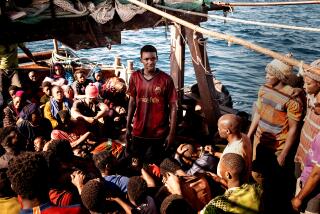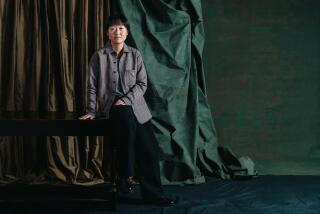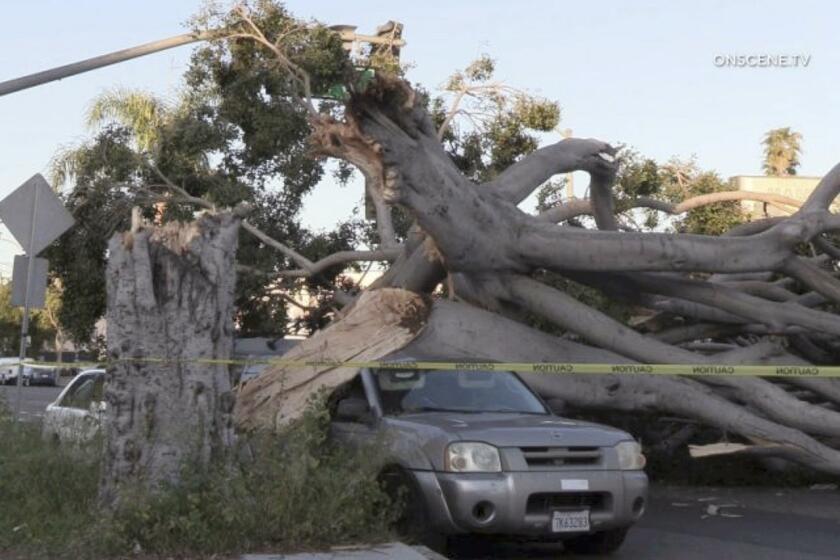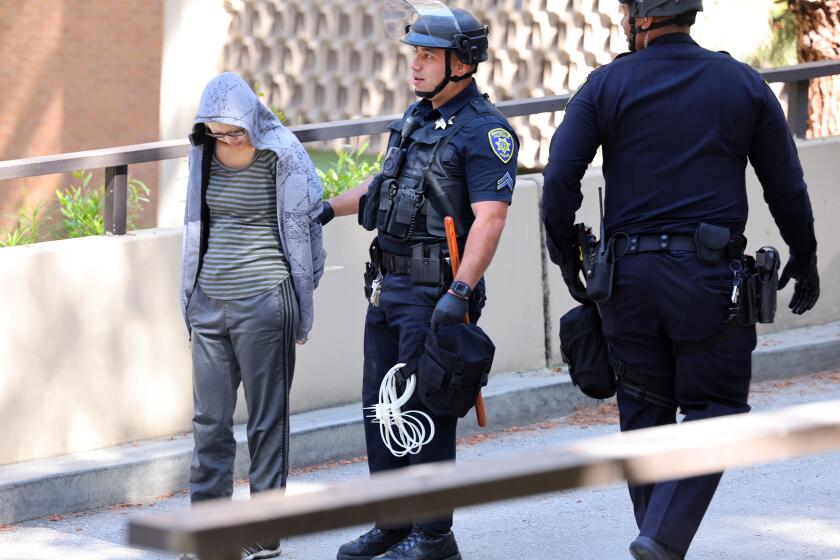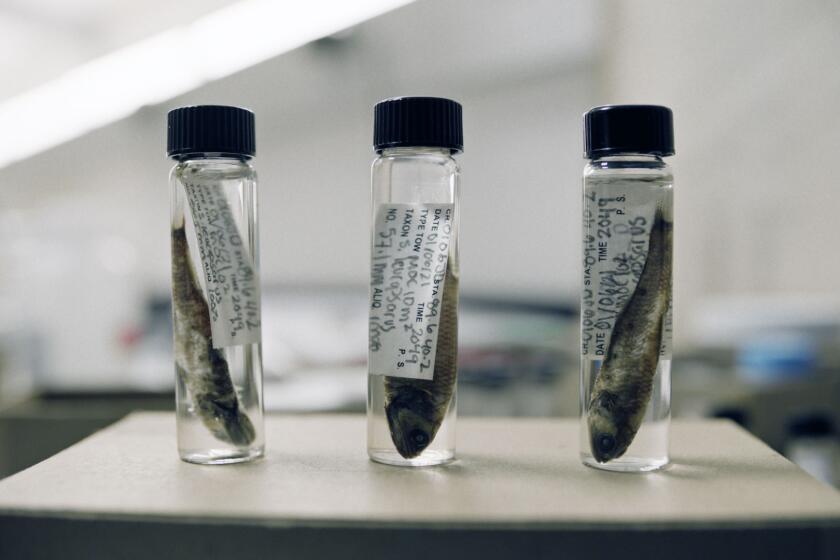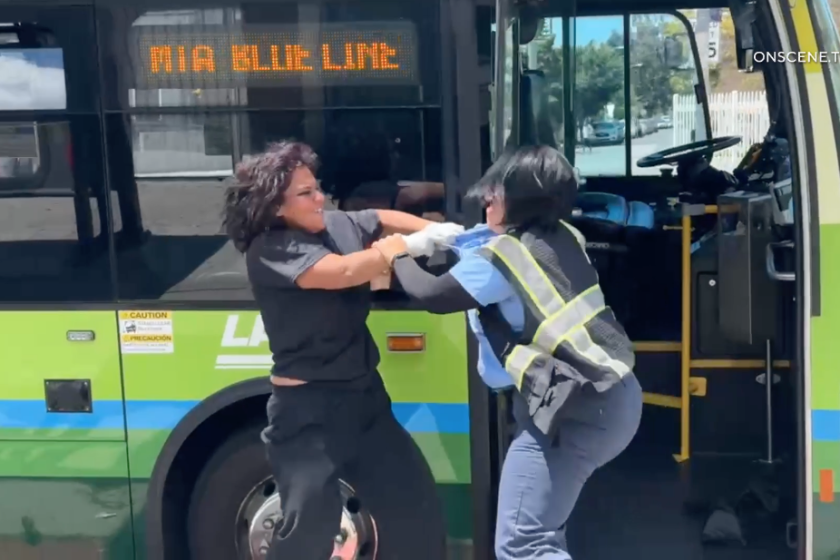Hiep Thi Le’s life could’ve been a movie; instead the refugee became a star playing someone else
Her own saga as a refugee could have been a movie itself, but instead Hiep Thi Le tumbled into a career as an actress by portraying another woman’s flight from war-torn Vietnam to America.
While a young psychology student at UC Davis, Le reluctantly tagged along with her sister and friends for a casting call for Oliver Stone’s “Heaven & Earth,” not expecting much to come from the effort. She had never heard of the director and didn’t envision herself an actor, and her own memories of fleeing Vietnam in a dilapidated fishing boat belonged to her childhood.
But as actors gathered at a reading before filming commenced, eager to meet their star, it would be clear why Stone’s search for the film’s female lead settled on Le.
“I kept looking around for the person who would get our attention,” remembered Thuan Le Elston, a former Times staff writer who also earned a role in the film and wrote about the experience. “And I saw this girl — she seemed like 15, bouncing all over, full of fun. I thought to myself, ‘Whose younger sister is this?’
“We were there for something very serious,” Elston added, “and I was flabbergasted when they told me she would be the center of the film… I soon understood why. On camera, she was luminous.”
Le won the starring role in the 1993 film and had a Hollywood career before shifting gears and opening a pair of Vietnamese restaurants in the South Bay and competing on the Food Network. She married, had two children and had completed a memoir when she was diagnosed with stomach cancer. She was 46 when she died Dec. 16 in Los Angeles.
“She came out of nowhere, after countless open calls, and just immediately stood out to me as someone so open, so fresh,” said Heidi Levitt, the casting director for the film. “The magnificent spirit she exudes in the film is also a reflection of how she is in real life.”
Born Feb. 19, 1971, in Da Nang in central Vietnam, Le was raised in extreme poverty. She told the Spirit Fanzine, a German entertainment publication, that she grew up in a hut with earthen floors and that she and her younger sister regarded the explosions and the menacing helicopters in the distance as dragons fighting. Her father, she said, was the chief wizard in the village where they lived and applied mythology to nearly everything that happened.
“The explanation given to me for the cruelty going on around us was always coated in folklore,” she said. “Such is the Vietnamese way.”
When their father disappeared, Le and her younger sister were put on a fishing boat by their mother and sent to find him in Hong Kong, where they believed he had gone to look for work.
Squeezed in with 33 other passengers, the sisters — 8 and 6 — arrived in Hong Kong only to be tossed into a refugee camp. Shuttled from camp to camp, Le and her sister bumped into their father at one of the sites, recognizing him only because of his distinctive gold tooth. Sponsored by a church and a cousin already in the U.S., the three came to America and settled in Oakland. Their mother later joined them.
The first movie Le saw was on their flight to the U.S.: “Superman.” She recalled viewing the film in silence, unaware that the nearby headphones would supply the volume.
Intent on becoming a doctor, Le earned a scholarship to UC Davis. She attended the casting call only because her friends had promised they’d swing by a swap meet afterward. A week later, the studio called and asked her to fly to L.A. to meet Stone. She was convinced they’d mixed her up with one of the other aspiring actresses. They hadn’t.
“There was no girl that I saw that I thought was going to carry that role,” Stone said later. “Then Hiep showed up. The moment she walked into the room, I knew she was special.”
On set, Le learned deeper details of the conflict that had enveloped her life as a child and watched Stone’s earlier Vietnam War films, “Platoon” and “Born on the Fourth of July,” which focused on warfare and a soldier’s return to a divided America. “Heaven & Earth” was a refugee story based on writer and humanitarian Le Ly Hayslip’s memoir “When Heaven and Earth Changed Places.” Le said Tommy Lee Jones, the film’s leading man, helped her become comfortable with her role.
The moment she walked into the room, I knew she was special.
— Oliver Stone, director
She also read Hayslip’s memoir and became friends with the author, whose life story — though more brutal and far more complex — paralleled Le’s. Both women were raised in rural regions of Vietnam, and as Le climbed trees and balanced herself on a water buffalo for different scenes, the author and the cast grew to admire her effervescent spirit.
“She liked to make everyone happy,” Hayslip said. “As an amateur actor, she was always willing to try new things and clearly, her own life would make a wonderful documentary.”
Film critic Roger Ebert applauded the movie, saying Le’s performance was extraordinary and “reflected the disorientation of a woman whose life and values are placed in turmoil.” Reviews of the film were mixed, though Le was singled out as being “authentic” and “compelling.”
Following “Heaven & Earth”, Le landed roles in “Bugis Street,” “Green Dragon” playing opposite Patrick Swayze and “Cruel Intentions” with a young Reese Witherspoon. She later expanded into the restaurant industry, serving as chef of China Beach Bistro in Venice before becoming chef and owner of Le Cellier, a French-Vietnamese fusion restaurant in Marina del Rey.
Hayslip remembers Le offering free meals to first-time visitors to her restaurants simply because they were fellow Vietnamese. “She worked endlessly. I constantly worried whether she could make enough money,” Hayslip said, for her friend was “always giving help.”
In 2014, Le competed on the Food Network show “Chopped.” She also wrote a memoir with hopes it would eventually become a movie. “Daughter of the Sea: My Voyage to Freedom and Womanhood” has yet to be published.
Le is survived by her husband, Djinn, two children, six brothers and sisters, and her parents.
Elston, now an editor at USA Today, said she visited Le in November and left remembering her smile — “that million-dollar smile just glowed. She was prepared to go, but she still wanted to make sure those left behind were well.”
Twitter: @newsterrier
More to Read
Start your day right
Sign up for Essential California for news, features and recommendations from the L.A. Times and beyond in your inbox six days a week.
You may occasionally receive promotional content from the Los Angeles Times.


